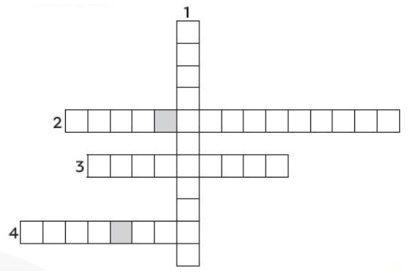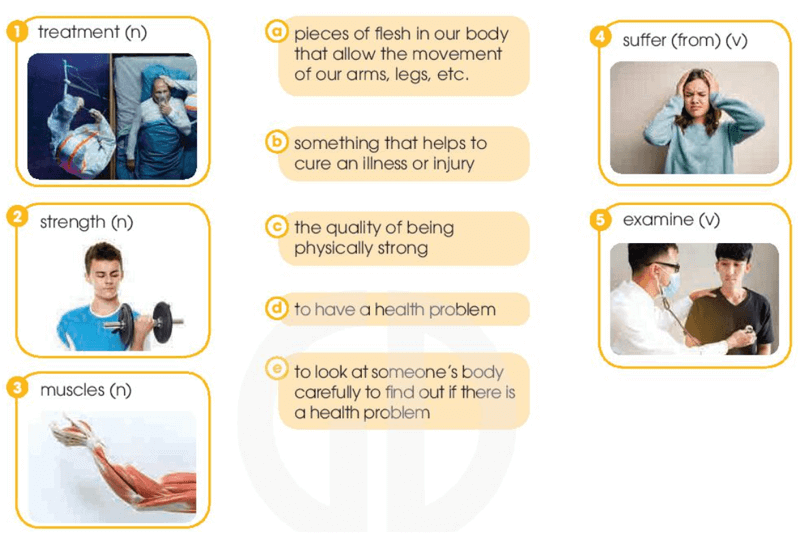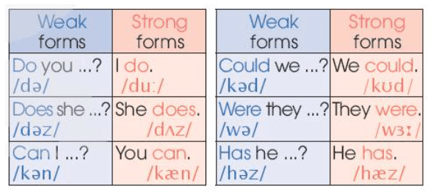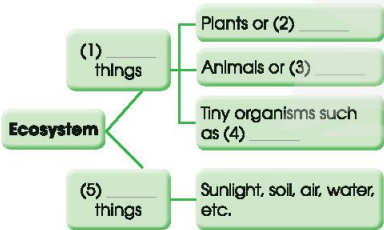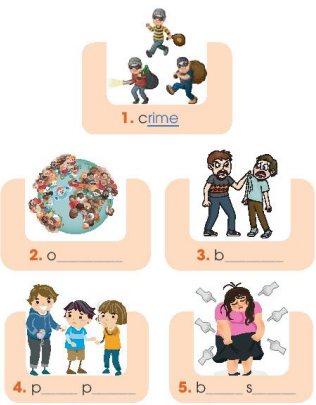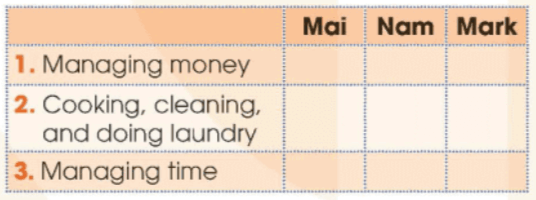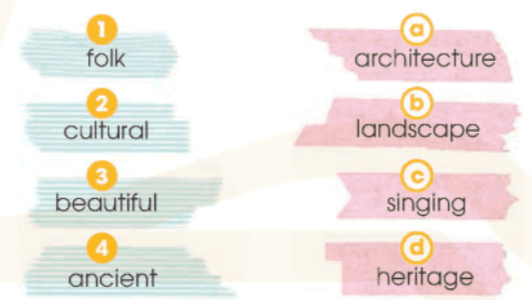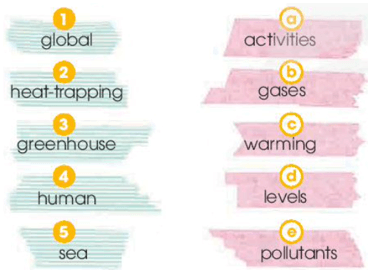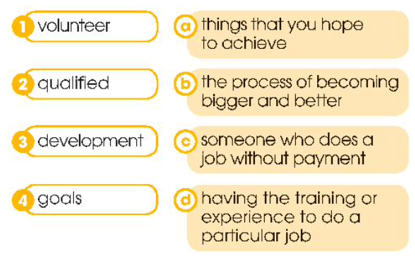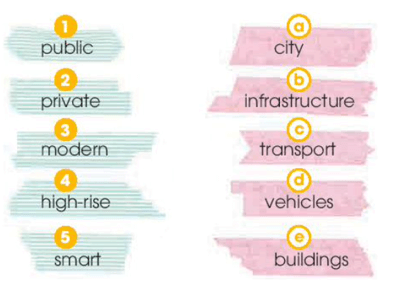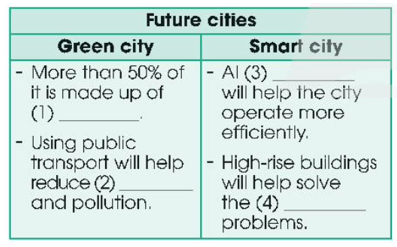2 (trang 11 Tiếng Anh 11 Global Success): Read the article. Solve the crossword with words and phrases from it. (Đọc bài viết. Giải ô chữ với các từ và cụm từ từ nó.)
DOWN
1. (Section A, noun) the things from which something is made
ACROSS
2. (First paragraph before Section A, noun phrase) the number of years that a person is likely to live
3. (Section A, noun) things to keep a living thing alive and help it grow
4. (Section B, phrasal verb) do physical exercise
Giải Tiếng Anh 11 (Global Success) Unit 1: A long and healthy life
1 (trang 11 Tiếng Anh 11 Global Success): Work in pairs. Look at the photos and discuss the questions. (Làm việc theo cặp. Nhìn vào các bức ảnh và thảo luận các câu hỏi.)
Which photos show healthy habits? (Những bức ảnh nào thể hiện thói quen lành mạnh?)
Which ones show unhealthy habits? (Những bức ảnh nào thể hiện thói quen không lành mạnh?)
Why? (Tại sao?)
Giải Tiếng Anh 11 (Global Success) Unit 1: A long and healthy life
2 (trang 11 Tiếng Anh 11 Global Success): Work in pairs. Talk about what you do to keep fit and healthy. Use the past simple and the present perfect. (Làm việc theo cặp. Nói về những gì bạn làm để giữ dáng và khỏe mạnh. Sử dụng thì quá khứ đơn và hiện tại hoàn thành.)
Giải Tiếng Anh 11 (Global Success) Unit 1: A long and healthy life
1 (trang 11 Tiếng Anh 11 Global Success): Put the verbs in brackets in either the past simple or the present perfect. (Chia động từ trong ngoặc ở thì quá khứ đơn hoặc hiện tại hoàn thành.)
1. He (see) the doctor yesterday.
2. She (suffer) from a serious headache, but after treatment, she felt better.
3. Our living conditions (improve) over the last few decades. Now people live much better.
4. The doctor (just, examine) her. Fortunately, the treatment is working.
Giải Tiếng Anh 11 (Global Success) Unit 1: A long and healthy life
2 (trang 10 Tiếng Anh 11 Global Success): Complete the following sentences using the correct forms of the words in 1. (Hoàn thành các câu sau sử dụng dạng đúng của từ trong bài 1.)
1. The doctor … her carefully, but could not find anything wrong.
2. He is receiving … for his health problem.
3. Regular exercise can help you improve your muscle …
4. To build your …, you can try lifting weights.
5. Nam can't sleep well. He is … stress.
Giải Tiếng Anh 11 (Global Success) Unit 1: A long and healthy life
2 (trang 9 Tiếng Anh 11 Global Success): Work in pairs. Read these sentences out loud. Pay attention to the strong and weak forms of the auxiliary verbs. Then listen and check. (Làm việc theo cặp. Đọc to những câu này. Chú ý đến dạng mạnh và dạng yếu của trợ động từ. Sau đó nghe và kiểm tra.)
Bài nghe:
1. Does she exercise? - Yes, she does.
2. Were you eating healthily? - Yes, I was.
3. Do you eat vegetables? - Yes, I do.
4. Can he get up early? - Yes, he can.
Giải Tiếng Anh 11 (Global Success) Unit 1: A long and healthy life
Bài nghe:
Bài làm:
Giải Tiếng Anh 11 (Global Success) Unit 1: A long and healthy life
4. Use the words in the box to form compound nouns mentioned in 1. Match them with the meanings below.
(Sử dụng các từ trong hộp để tạo thành các danh từ ghép được đề cập trong phần 1. Nối chúng với các nghĩa bên dưới.)
|
raw |
climate |
change |
resources |
|
park |
natural |
national |
materials |
|
1. a change in the earth's weather conditions |
__________ |
|
2. things that exist in nature and can be used by people |
__________ |
|
3. land protected by the government because of its natural beauty or special history |
__________ |
|
4. basic materials used to make products |
__________ |
Giải Tiếng Anh 11( Global Success) Unit 10: The ecosystem
2. Read the conversation again and decide whether these statements are true (T) or false (F).
(Đọc đoạn hội thoại một lần nữa và quyết định xem những câu này là đúng (T) hay sai (F).)
|
|
T |
F |
|
1. Nam went to Cuc Phuong National Park two weeks ago. |
|
|
|
2. In an ecosystem, plants, animals, and other living and non-living things form a community. |
|
|
|
3. We are losing a large number of ecosystems around the world. |
|
|
Giải Tiếng Anh 11( Global Success) Unit 10: The ecosystem
1. Listen and read.
(Nghe và đọc.)
Ms Hoa: Nam, you went to Cuc Phuong National Park last weekend, didn‘t you?
Nam: Yes, that’s right. It was an amazing trip. This old forest is home to thousands of different kind of plants, insects, and animals. I really liked the colourful butterflies and the thousand-year-old tree.
Ms Hoa: Yes, Cuc Phuong National Park has a very rich ecosystem.
Mai: What's an ecosystem, Ms Hoa?
Ms Hoa: It's a community that has living things, like flora and fauna. Flora refers to plants and fauna refers to animals, including tiny organisms, like bacteria. Ecosystems also include non-living things, like sunlight, air, soil, and water.
Nam: How important are ecosystems to life on our planet, Ms Hoa?
Ms Hoa: Healthy ecosystems are essential for human health and survival because they provide us with goods such as food, energy, raw materials, clean water, and air.
Mai: So we should protect our ecosystems, shouldn't we?
Ms Hoa: That's right. Unfortunately, many ecosystems around the world are being lost, damaged, or destroyed because of climate change, pollution, and overuse of natural resources. It’s very important to protect and restore them for future generations. We don't want our planet to lose even more biodiversity, do we?
Giải Tiếng Anh 11( Global Success) Unit 10: The ecosystem
4. Complete the summary with words from 1.
(Hoàn thành phần tóm tắt với các từ từ 1.)
Nam believes that there are major teen problems today (1) ___________ many people don't feel comfortable talking about them. Mai agrees with him. Mark thinks they should focus on a problem teens struggle with every day. (2) ___________, they'll try to use Mai’s ideas for another project. Finally, Nam suggests focusing their campaign on bullying (3) __________ this issue is very common among teenagers these days.
Giải Tiếng Anh 11( Global Success) Unit 9: Social issues
2. Who suggests the following ideas? Tick (✓) the correct box.
(Ai gợi ý các ý sau? Đánh dấu (✓) vào ô đúng.)
|
|
Mark |
Mai |
Nam |
|
1. Issues that have an effect on many people in the city. |
|
|
|
|
2. Problems that have a direct impact on teens. |
|
|
|
|
3. An issue that teens face in their everyday life. |
|
|
|
Giải Tiếng Anh 11( Global Success) Unit 9: Social issues
1. Listen and read.
(Nghe và đọc.)
Mark: Hi, everyone. Last time our club met, we decided to start an awareness campaign to draw attention to a pressing social issue. So have you thought about any issues that we could focus on?
Mai: Yes, I think we should promote issues that affect a lot of people in our city, such as crime and overpopulation.
Nam: I like your ideas, Mai, but I think we should plan our campaign around social issues that directly affect teenagers like us.
Mark: Can you give us some examples?
Nam: Well, bullying, peer pressure, and body shaming, for instance, are major problems among teenagers today although many people don’t feel comfortable talking about them.
Mai: I agree with you. Hmm... so Mark, what do you think? Should we focus our campaign on a general social issue or one affecting mainly teens?
Mark: Hmm. I think this time we should focus on a problem teens struggle with every day because this won't be a big campaign. However, we'll try to use your ideas for another project, Mai.
Mai: Sounds good! Now let’s decide on a social issue. Is the top problem facing teens today peer pressure, body shaming, or bullying?
Nam: I think it’s bullying because it’s very common today, and ...

Giải Tiếng Anh 11( Global Success) Unit 9: Social issues
4 (trang 87 Tiếng Anh 11 Global Success): Match the two halves to make sentences used in 1. (Nối hai nửa để tạo câu được sử dụng trong 1)
|
1. It’s my mum |
a. that took a long time |
|
2. It was earning my parents’ trust |
b. who still think I don’t have the skills to be independent. |
|
3. It’s my parents |
c. that taught me how to be responsible with money |
|
4. It’s the app |
d. who’s calling me again |
Giải Tiếng Anh 11( Global Success) Unit 8: Becoming independent
3 (trang 87 Tiếng Anh 11 Global Success): Find words and a phrase in 1 that have the following meanings. (Tìm các từ và một cụm từ bài 1 có các nghĩa sau)
1. a belief in your own ability to do things well
2. confident and free to do things without help from other people
3. things that you must do as part of your duty or job
4. the activity of planning how to spend and save money
Giải Tiếng Anh 11( Global Success) Unit 8: Becoming independent
2 (trang 87 Tiếng Anh 11 Global Success): Read the conversation again and decide who has these skills. Put a tick (v) in the correct column. (Đọc đoạn hội thoại một lần nữa và quyết định xem ai có những kỹ năng này. Đánh dấu (v) vào cột đúng)
Giải Tiếng Anh 11( Global Success) Unit 8: Becoming independent
1 (trang 86 Tiếng Anh 11 Global Success): Listen and read (Nghe và đọc)
Bài nghe:
Nam: Mai, why don't you answer your phone? It keeps ringing.
Mai: It’s my mum who's calling me again. She wants me to contact her from time to time while I’m out.
Nam: My parents usec to be like that. They thought I didn’t have the confidence to deal with difficult situations.
Mark: I had the same experience. It was earning my parents’ trust that took a long time. But I managed to convince them that I'm responsible when I’m out and about.
Mai: It’s my parents who still think I don’t have the skills to be independent. I'm not good at managing my time or money, but I’m independent at home - I can cook, clean the house, and do my laundry!
Nam: That’s a good star! I use a time-management app to plan my weekly schedule including all my activities and responsibilities. Would you like me to help you install it?
Mai: That'd be great. Thanks, Nam.
Mark: I use a money-management app. It’s the app that taught me how to be responsible with money.
Mai: Mark, can you show it to me?
Mark: No problem. My parents also encourage me to take part-time jobs and pay me for doing certain chores around the house.
Mai: Lucky you!
Giải Tiếng Anh 11( Global Success) Unit 8: Becoming independent
4 (trang 77 Tiếng Anh 11 Global Success): Complete the sentences using phrases from 1. (Hoàn thành các câu sử dụng các cụm từ bài 1)
1. _________ several biology competitions, Mai wants to study biology and become a scientist.
2. Mai’s mum still regrets not _________ to university.
3. _________ father work very hard for many years helped Nam make his decision.
Giải Tiếng Anh 11( Global Success) Unit 7: Education options for school-leavers
3 (trang 77 Tiếng Anh 11 Global Success): Find phrases in the conversation that mean the following. (Tìm các cụm từ trong đoạn hội thoại có nghĩa như sau)
1. an event at which students can talk to representatives of universities or vocational schools about their study options.
2. an exam that someone takes to be accepted into a school or university.
3. studying at school or university to gain knowledge and develop thinking skills.
4. a place that teaches skills needed for particular jobs.
Giải Tiếng Anh 11( Global Success) Unit 7: Education options for school-leavers
2 (trang 77 Tiếng Anh 11 Global Success): Read the conversation again. Decide whether the following statements are true (T) or false (F). (Đọc đoạn hội thoại một lần nữa. Quyết định xem những câu sau đây là đúng (T) hay sai (F)
1. School-leavers only have the option of academic education.
2. Good grades at school can help students get into university.
3. Vocational schools are for those who want to develop job skills.
4. Nam wants to work at his father’s car repair shop after leaving school.
Hướng dẫn dịch:
1. Học sinh nghỉ học chỉ có lựa chọn giáo dục học thuật.
2. Điểm tốt ở trường có thể giúp học sinh vào đại học.
3. Trường dạy nghề dành cho những người muốn phát triển kỹ năng nghề nghiệp.
4. Nam muốn làm việc tại cửa hàng sửa chữa ô tô của cha mình sau khi rời ghế nhà trường.
Giải Tiếng Anh 11( Global Success) Unit 7: Education options for school-leavers
1 (trang 76 Tiếng Anh 11 Global Success): Listen and read (Nghe và đọc)
Bài nghe:
Ms Hoa: Good morning, class. There was an education fair last weekend. Did anyone go?
Nam: Yes, Mai and I did. The fair was great, and we got a lot of useful information.
Ms Hoa: I'm glad to hear that. Would you like to share some of it with the class?
Mai: Sure. After finishing school, we mainly have two education options. For example, we can get into university if we earn high grades or pass the university entrance exam.
Nam: That's true, but academic education isn’t everything. The other option is going to a vocational school where we can learn skills for particular jobs.
Ms Hoa: That sounds interesting. So what are your plans for the future?
Mai: I'm hoping to go to university. Having won several biology competitions, I want to study biology and become a scientist.
Ms Hoa: Great! It’s really important to follow your dream, Mai.
Mai: My mum still regrets not having gone to university. So I want to make her proud of me. How about you, Nam?
Nam: Well, I don’t think university is for me. I want to go to a vocational school because I want to become a car mechanic. My father owns a car repair shop. Having watched him work very hard for many years helped me make my decision.
Ms Hoa: That's very sensible, Nam! I hope you can help him grow his business.
Giải Tiếng Anh 11( Global Success) Unit 7: Education options for school-leavers
4 (trang 67 Tiếng Anh 11 Global Success): Complete the sentences using phrases from 1. (Hoàn thành các câu sử dụng các cụm từ bài 1)
1. Trang An is the only place in Southeast Asia _____________.
2. You can go on a boat trip ____________.
3. You can visit the old temples and monuments _____________.
4. Performing folk songs at floating markets is a great way _____________.
Giải Tiếng Anh (Global Success) Unit 6: Preserving our heritage
2 (trang 67 Tiếng Anh 11 Global Success): Where can we do the following? Write T for Trang An, H for Hoi An, and M for Mekong River Delta. (Chúng ta có thể làm những điều sau đây ở đâu? Viết T cho Tràng An, H cho Hội An, và M cho Đồng bằng sông Cửu Long)
|
Activity |
Place |
|
1. Going on a tour by boat |
|
|
2. Seeing areas of natural beauty |
|
|
3. Seeing ancient houses kept in their original style of architecture |
|
|
4. Listening to don ca tai tu at floating markets |
|
Giải Tiếng Anh (Global Success) Unit 6: Preserving our heritage
1 (trang 66-67 Tiếng Anh 11 Global Success): Listen and read (Nghe và đọc)
Bài nghe:
Ms Hoa: Good morning, everyone. As part of our school cultural programme, we need to plan a field trip to a heritage site in Viet Nam. So, where would you like to go?
Peter: Do you have any suggestions for us, Ms Hoa?
Ms Hoa: I'd recommend Trang An Scenic Landscape Complex. It’s the only place in Southeast Asia to be recognised as a mixed heritage site by UNESCO.
Peter: What's a mixed heritage site?
Ms Hoa: It's a site that has both natural and cultural importance. For example, you can go on a boat trip there to enjoy the beautiful landscape. Or you can visit the old temples and monuments to learn about Vietnamese history.
Anna: That sounds interesting, but if we want to learn about cultural values of the past, where should we go?
Ms Hoa: You can go to Hoi An Ancient Town in central Viet Nam. You'll learn about urban lifestyles and traditions from the 15th to the 19th century and will see examples of ancient architecture. All buildings are kept in their original state. It’s a great place to explore.
Anna: Wow! That's exciting. What about southern Viet Nam?
Ms Hoa: You can go to the Mekong River Delta to enjoy don ca tai tu - a form of traditional folk singing. Local artists perform don ca tai tu everywhere - at parties, in fruit gardens, even on the floating market boats.
Peter: It’s a great way to promote this kind of cultural heritage of southern Viet Nam.
Ms Hoa: Indeed. Now, please discuss in your group and let me know your field trip ideas.
Giải Tiếng Anh (Global Success) Unit 6: Preserving our heritage
4 (trang 53 Tiếng Anh 11 Global Success): Complete the sentences with the correct verb forms from 1 (Hoàn thành các câu với các dạng động từ chính xác từ 1)
1. ______ for energy, fossil fuels release large amounts of carbon dioxide into the atmosphere.
2. ______ too much of the sun’‘s heat, greenhouse gases stop it from escaping back into space.
3. As temperatures rise, polar ice caps melt faster, ______ more water to oceans.
Giải Tiếng Anh 11(Global Success) Unit 5: Global Warming
2 (trang 53 Tiếng Anh 11 Global Success): Read the conversation again and complete the diagram, using the following phrases. (Đọc đoạn hội thoại một lần nữa và hoàn thành sơ đồ, sử dụng các cụm từ sau)
a. Trapping the sun‘s heat
b. Making the planet warmer
c. Producing certain gases (e.g. CO2)
d. Stopping the heat from escaping
Giải Tiếng Anh 11(Global Success) Unit 5: Global Warming
1 (trang 52 Tiếng Anh 11 Global Success): Listen and read (Nghe và đọc)
Bài nghe:
Mr Quang: Good morning, class. Today’s lesson will start with Mai and Nam’s talk about some of the causes and consequences of global warming. Would you like to go first, Mai?
Mai: Yes, thank you. First, let me remind you what global warming refers to - it’s the increase in the earth's temperature because of certain gases in the atmosphere.
Nam: Exactly. These gases are mainly produced through human activities. For example, burnt for energy, fossil fuels release large amounts of carbon dioxide into the atmosphere.
Mr Quang: But how do these gases make the earth warmer?
Mai: Well, they act like the glass in a greenhouse. Trapping too much of the sun’s heat, they stop it from escaping back into space. This makes the planet hotter and hotter.
Nam: That's right. That’s why these heat-trapping pollutants are known as greenhouse gases, and their impact is called the greenhouse effect.
Mai: Global warming is also linked to rising sea levels. As temperatures rise, polar ice caps melt faster, adding more water to oceans. Higher sea levels can also lead to floods.
Nam: Each year, the consequences of global warming become more serious, and its negative impact on the environment and people gets stronger.
Mr Quang: Good job! Thank you for sharing the information.
Giải Tiếng Anh 11(Global Success) Unit 5: Global Warming
4 (trang 43 Tiếng Anh 11 Global Success): Complete the sentences using words and a phrase from 1 (Hoàn thành các câu sử dụng từ và cụm từ 1)
1. ______________ in the programme was an unforgettable experience for Mai’s cousin.
2. The main goals of AYVP are ________ youth volunteering and ________ the development of the ASEAN community.
3. Ms Pang suggested ______________ their website.
4. Mai thanked Ms Pang for _______________ her.
Giải Tiếng Anh 11 (Global Success) Unit 4: The generation gap
2 (trang 43 Tiếng Anh 11 Global Success): Read the conversation again and decide whether the following statements are true (T) or false (F) (Đọc đoạn hội thoại một lần nữa và quyết định xem những câu sau đây là đúng (T) hay sai (F))
1. Mai is a member of the ASEAN Youth Volunteer Programme.
2. One of the aims of AYVP is to help young people volunteer.
3. Mai can only find last year’s themes on the AYVP’s website.
4. Mai can apply to join the AYVP when she turns 18.
Hướng dẫn dịch:
1. Mai là thành viên của Chương trình Thanh niên tình nguyện ASEAN.
2. Một trong những mục tiêu của AYVP là giúp những người trẻ tình nguyện.
3. Mai chỉ có thể tìm thấy các chủ đề của năm ngoái trên trang web của AYVP.
4. Mai có thể đăng ký tham gia AYVP khi đủ 18 tuổi.
Giải Tiếng Anh 11 (Global Success) Unit 4: The generation gap
1 (trang 42 Tiếng Anh 11 Global Success): Listen and read (Nghe và đọc)
Bài nghe:
Mai: Good afternoon. My name’s Mai Nguyen. Are you Ms Pang? You replied to my email and invited me to visit your office.
Ms Pang: Yes. I’m Ms Pang. It’s nice to meet you, Mai. So how did you hear about us?
Mail: My cousin was an AYVP volunteer. He often said taking part in the programme was an experience he would never forget.
Ms Pang: Glad to hear that. The main goals of AYVP are promoting youth volunteering and helping the development of the ASEAN community.
Mai: What can I do to prepare for the programme?
Ms Pang: Well, to become an AYVP volunteer, you must be qualified for the programme, and this depends on the themes for the year.
Mai: What are the areas covered by AYVP?
Ms Pang: There are eight themes. I suggest checking our website to find out this year’s themes.
Mai: How are volunteers selected?
Ms Pang: To be selected, you should be over 18. Then you may need to propose a community project related to the theme. And we'll probably interview you to make sure you speak English well and are very keen on participating in the programme.
Mai: That doesn't sound too difficult. Thanks so much for meeting me.
Ms Pang: You're welcome.
Giải Tiếng Anh 11 (Global Success) Unit 4: The generation gap
4 (trang 29 Tiếng Anh 11 Global Success): Complete the sentences with phrases from 1 (Hoàn thành các câu với các cụm từ từ 1)
1. It _________ to many environmental problems.
2. The modern infrastructure of the city __________.
3. I _________ living in a smart city in the future.
Giải Tiếng Anh 11 (Global Success) Unit 3: Cities of the future
2 (trang 29 Tiếng Anh 11 Global Success): Read the conversation again and complete the notes. Use no more than TWO words for each blank (Đọc đoạn hội thoại một lần nữa và hoàn thành các ghi chú. Sử dụng không quá HAI từ cho mỗi chỗ trống)
Giải Tiếng Anh 11 (Global Success) Unit 3: Cities of the future
1 (trang 28-29 Tiếng Anh 11 Global Success): Listen and read (Nghe và đọc)
Bài nghe:
Ms Smith: Good morning. Welcome to our exhibition: Future Cities. Here you can see models of our cities of the future. Please take a look around and feel free to ask me any questions.
Nam: This model looks very interesting. Can you tell me more about it, Ms Smith?
Ms Smith: Yes. This is a ‘green city’ designed to reduce its negative impact on the environment. As you can see, more than fifty per cent of it is made up of green areas.
Nam: I don’t see any private vehicles on the roads.
Ms Smith: Most people will use public transport such as trams and electric buses. There will be fewer traffic jams and less pollution.
Nam: So city dwellers will stop using their cars in urban areas.
Ms Smith: That's the idea.
Nam: I like it. It seems a good solution to many environmental problems.
(...)
Mai: Let’s look at the city over there. I can see robots and lots of cameras in the streets. What's special about this city?
Ms Smith: It's called a ‘smart city’. Al technologies, such as cameras and smart sensors, will be installed to help the city operate more efficiently.
Mai: The modern infrastructure of the city looks beautiful. I’m really impressed with the high-rise buildings.
Ms Smith: Tall buildings can actually limit the carbon footprint of the built environment and help solve housing problems in big cities.
Mai: Mmm, I'm thinking of living in a smart city in the future.
Giải Tiếng Anh 11 (Global Success) Unit 3: Cities of the future
